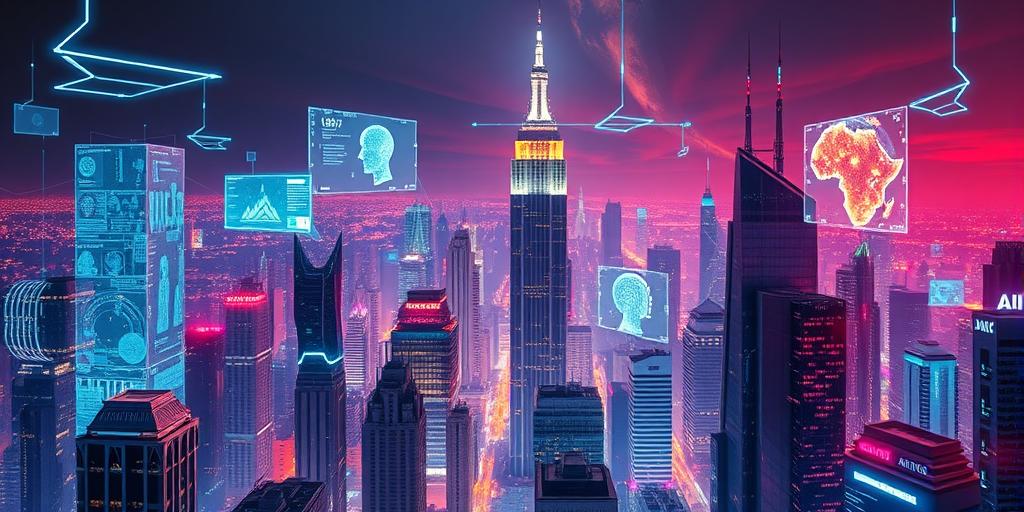Have you ever wondered how seemingly futuristic technologies are rapidly changing the way we live and work? Emerging technologies are no longer a distant dream; they are reshaping industries, creating new markets, and disrupting traditional business models at an unprecedented pace. Prepare to be amazed as we explore the seismic shifts caused by these game-changing innovations, and discover how they’re revolutionizing everything around us!
The Rise of the Machines: Automation and AI’s Impact
Artificial intelligence (AI) and automation are two of the most disruptive forces in modern business. From self-driving cars to robotic process automation (RPA), these technologies are transforming industries. They’re increasing efficiency, reducing costs, and creating entirely new business opportunities. But this technological revolution isn’t without its challenges. The impact of AI on jobs is a hot topic, with concerns about job displacement and the need for workforce reskilling and upskilling. Businesses must strategically implement these technologies to manage the transition and ensure a smooth integration into their operations. Successfully navigating this technological shift will determine the future success of many companies. The impact of AI on various sectors is not uniform, some sectors, like manufacturing and logistics, experience rapid transformation while other sectors, like education and healthcare, face slower, more gradual changes. Furthermore, ethical considerations in the development and use of AI are paramount to avoid potential biases or misuse.
Subheading 1: Automation in Manufacturing
The manufacturing industry is witnessing an incredible surge in automation, with robots taking on increasingly complex tasks. This leads to higher production rates, improved product quality, and reduced labor costs. However, it also leads to concerns about job security for factory workers, necessitating investment in retraining programs.
Subheading 2: AI in Customer Service
AI-powered chatbots and virtual assistants are revolutionizing customer service. They provide 24/7 support, handle a large volume of inquiries simultaneously, and offer personalized experiences. This improves customer satisfaction while reducing the need for human customer service representatives.
The Blockchain Revolution: Decentralization and Transparency
Blockchain technology, the foundation of cryptocurrencies like Bitcoin, is disrupting industries far beyond finance. Its decentralized and transparent nature makes it ideal for supply chain management, ensuring product authenticity and traceability. Healthcare is another sector seeing significant changes; blockchain can securely store and manage patient data, improving data privacy and interoperability. Real estate, voting systems, and digital identity management are other areas seeing the transformative impact of this groundbreaking technology. It is important to understand the nuances of blockchain implementations and potential challenges, such as scalability and regulatory hurdles, to fully harness its potential. Long-term benefits and successful adoption depend on carefully navigating these potential issues.
Subheading 1: Blockchain in Supply Chain Management
Imagine a world where every product’s journey from origin to consumer is completely transparent and verifiable. This is the promise of blockchain in supply chain management. It improves efficiency, reduces fraud, and increases consumer trust.
Subheading 2: Blockchain in Healthcare
The healthcare industry is notorious for its data silos and privacy concerns. Blockchain technology offers a solution by creating a secure and transparent platform for sharing patient data, improving data security and interoperability among different healthcare providers.
The Metaverse and the Future of Work and Interaction
The metaverse, a persistent, shared, 3D virtual world, presents another significant disruption. While still in its early stages, it holds immense potential for revolutionizing communication, collaboration, and entertainment. Businesses can create immersive experiences for customers, and remote work will see a dramatic shift as the metaverse provides new virtual environments for collaboration. The metaverse represents a paradigm shift in the way we interact, work, and socialize, creating exciting yet uncertain prospects for numerous industries.
Subheading 1: Metaverse in Business
Businesses are exploring the use of the metaverse to create virtual showrooms, host conferences, and offer unique customer experiences. This opens new opportunities for marketing, sales, and customer engagement.
Subheading 2: Metaverse in Education
The metaverse has the potential to revolutionize education by providing immersive and interactive learning environments. Students can explore historical sites, conduct virtual experiments, and collaborate with peers in a highly engaging way.
Navigating Disruption: Preparing for the Future
The rapid advancements in emerging technologies are creating exciting opportunities and significant challenges. Businesses must adapt, innovate, and invest in reskilling and upskilling their workforce to remain competitive. Embracing these technologies, understanding their potential, and managing their impact is critical for future success. Those who fail to adapt risk being left behind. The future belongs to those who anticipate and embrace the changes these technologies bring, and to those who can innovate and create solutions within these rapidly evolving industries. The coming years will be a time of significant transformation, and understanding the disruption caused by these technologies is key to navigating the path ahead.
Ready to dive into the exciting world of technological disruption? Embrace the change and start innovating today!




